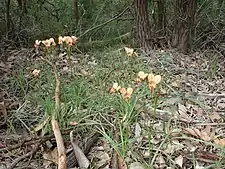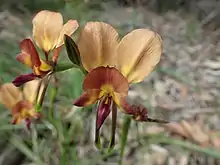Diuris jonesii
Diuris jonesii, commonly known as Dunsborough donkey orchid,[2] is a species of orchid that is endemic to the south-west of Western Australia. It has large, yellow, brown and mauve flowers and is found in near-coastal areas between Dunsborough and Augusta.

| Dunsborough donkey orchid | |
|---|---|
 | |
| Diuris jonesii growing near Ellen Brook Road in the Leeuwin-Naturaliste National Park | |
| Scientific classification | |
| Kingdom: | Plantae |
| Clade: | Tracheophytes |
| Clade: | Angiosperms |
| Clade: | Monocots |
| Order: | Asparagales |
| Family: | Orchidaceae |
| Subfamily: | Orchidoideae |
| Tribe: | Diurideae |
| Genus: | Diuris |
| Species: | D. jonesii |
| Binomial name | |
| Diuris jonesii | |
Description
Diuris jonesii is a tuberous, perennial herb, usually growing to a height of 250–400 mm (10–20 in). Two or three leaves emerge at the base, each leaf 100–300 mm (4–10 in) long and 5–12 mm (0.2–0.5 in) wide. There are between two and eight yellow, mauve and brown flowers 40–50 mm (1.6–2.0 in) long and 20–35 mm (0.8–1 in) wide. The dorsal sepal is erect and the lateral sepals are narrow and hang downwards or sometimes cross each other. The petals are elongated and the labellum has spreading lateral lobes and a broad, flattened or folded centre lobe. The species is similar to the giant donkey orchid, D. amplissima but has smaller, less colourful flowers and a more coastal distribution. Flowering occurs from late September to October.[2][3]
Taxonomy and naming
Diuris jonesii was first formally described in 2013 by Christopher French and Garry Brockman from a specimen collected at Cape Naturaliste and the description was published in Australian Orchid Review.[4] The specific epithet (jonesii) honours David Jones.[4]
Distribution and habitat
The Dunsborough donkey orchid grows in shrubland and woodland in near-coastal areas between Dunsborough and Augusta in the Jarrah Forest, Swan Coastal Plain and Warren biogeographic regions.[2][3][5]
Conservation
Diuris magnifica is classified as "not threatened" by the Western Australian Government Department of Parks and Wildlife.[5]
References
- "Diuris jonesii". World Checklist of Selected Plant Families (WCSP). Royal Botanic Gardens, Kew.
- Brown, Andrew; Dixon, Kingsley; French, Christopher; Brockman, Garry (2013). Field guide to the orchids of Western Australia : the definitive guide to the native orchids of Western Australia. Simon Nevill Publications. p. 211. ISBN 9780980348149.
- Hoffman, Noel; Brown, Andrew (2011). Orchids of South-West Australia (3rd ed.). Gooseberry Hill: Noel Hoffman. p. 474. ISBN 9780646562322.
- "Duiris jonesii". APNI. Retrieved 14 October 2018.
- "Diuris jonesii". FloraBase. Western Australian Government Department of Parks and Wildlife.